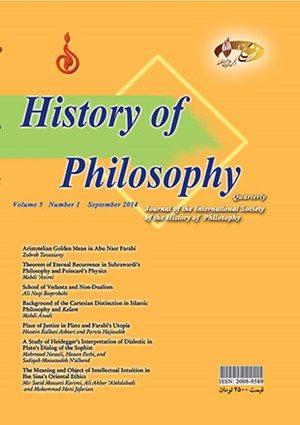Theorem of Eternal Recurrence in Suhrawardi’s Philosophy and Poincaré’s Physics
Subject Areas : Geneology of philosophical schools and Ideas
1 - Tehran University
Keywords: eternal recurrence proposition of recurrence Suhrawardi Poincaré, ,
Abstract :
“Eternal recurrence” is an old theorem in the history of philosophy stating that any event in the world will recur in future in a self-similar form an infinite number of times as it has recurred an infinite number of times previously. Suhrawardi discusses this theorem in his Hikmat al-ishraq and al-Mashari‘ wa al-mutarihat and adduces some arguments in order to demonstrate it. In his T‘aliqat written on Qutb al-Din Shirazi’s commentary on Hikmat al-ishraq, Mulla Sadra evaluates Suhrawardi’s argument and deems them unfounded. However, the falsity of the argument does not indicate the falsity of the claim, particularly, because we have Poincaré’s “proposition of recurrence” before us demonstrating that, in any system, the initial states of all component parts of a whole will recur after the passage of a sufficiently long time. This idea necessitates the demonstration of the theorem of “eternal recurrence”. Nevertheless, one must ask how long this sufficiently “long time” is. Based on the calculations of Chandrasekhar, for a spherical volume of air with a radius of one centimeter at a standard point of temperature and pressure, with one percent of fluctuation in density around the mean, this time is equal to 3 trillion years! Therefore, the time of the recurrence of the whole universe is so long that the life of its components will come to an end long before that time. This will make the recurrence of the universe impossible. Therefore, this paper concludes that the theorem of “eternal recurrence”, which Suhrawardi also believes in, is essentially possible but practically impossible.
ابراهيمي ديناني، غلامحسين، شعاع انديشه و شهود در فلسفة سهروردي، تهران، انتشارات حکمت، 1376. #
ابنسينا، حسين بن عبدالله، التعليقات، تحقيق عبدالرحمن البدوي، بيروت، مکتبة الإعلام الإسلامي، 1404 ق. #
ابنهروي، محمدشريف نظامالدين احمد، انواريه، مقدمة حسين ضيائي تربتي، تهران، مؤسسه انتشارات اميرکبير، 1363. #
ارسطو، متافيزيک، ترجمة شرفالدين خراساني، تهران، نشر گفتار، 1366. #
رازي، فخرالدين، المباحث المشرقية، قم، انتشارات بيدار، ج2، 1411ق. #
سهروردي، شهابالدين، مجموعة مصنفات شيخ اشراق، تصحيح و مقدمة هانري کربن، تهران، پژوهشگاه علوم انساني و مطالعات فرهنگي، 1380. #
شهرزوري، شمسالدين، شرح حکمةالاشراق، مقدمه و تحقيق حسين ضيائي تربتي، تهران، مؤسسه مطالعات و تحقيقات فرهنگي، 1372. #
شيرازي، قطبالدين، شرح حکمةالاشراق سهروردي، باهتمام عبدالله نوراني و مهدي محقق، تهران، انجمن آثار و مفاخر فرهنگي، 1384. #
ملاصدرا، تعليقات شرح حکمةالاشراق، در: حاشيه شرح قطبالدين شيرازي بر حکمةالاشراق سهروردي، چاپ سنگي، بيجا، 1315ق (تاريخ تحرير). #
Čapek, M., “Eternal Return” (1967), Encyclopedia of Philosophy, 2nd edition, Donald M. Borcher (ed)., vol 3, pp. 352-356, 2006. #
Dorfman, J. R., An Introduction to Chaos in Non Equilibrium Statical Machines, Cambridge University Press,1999. #


